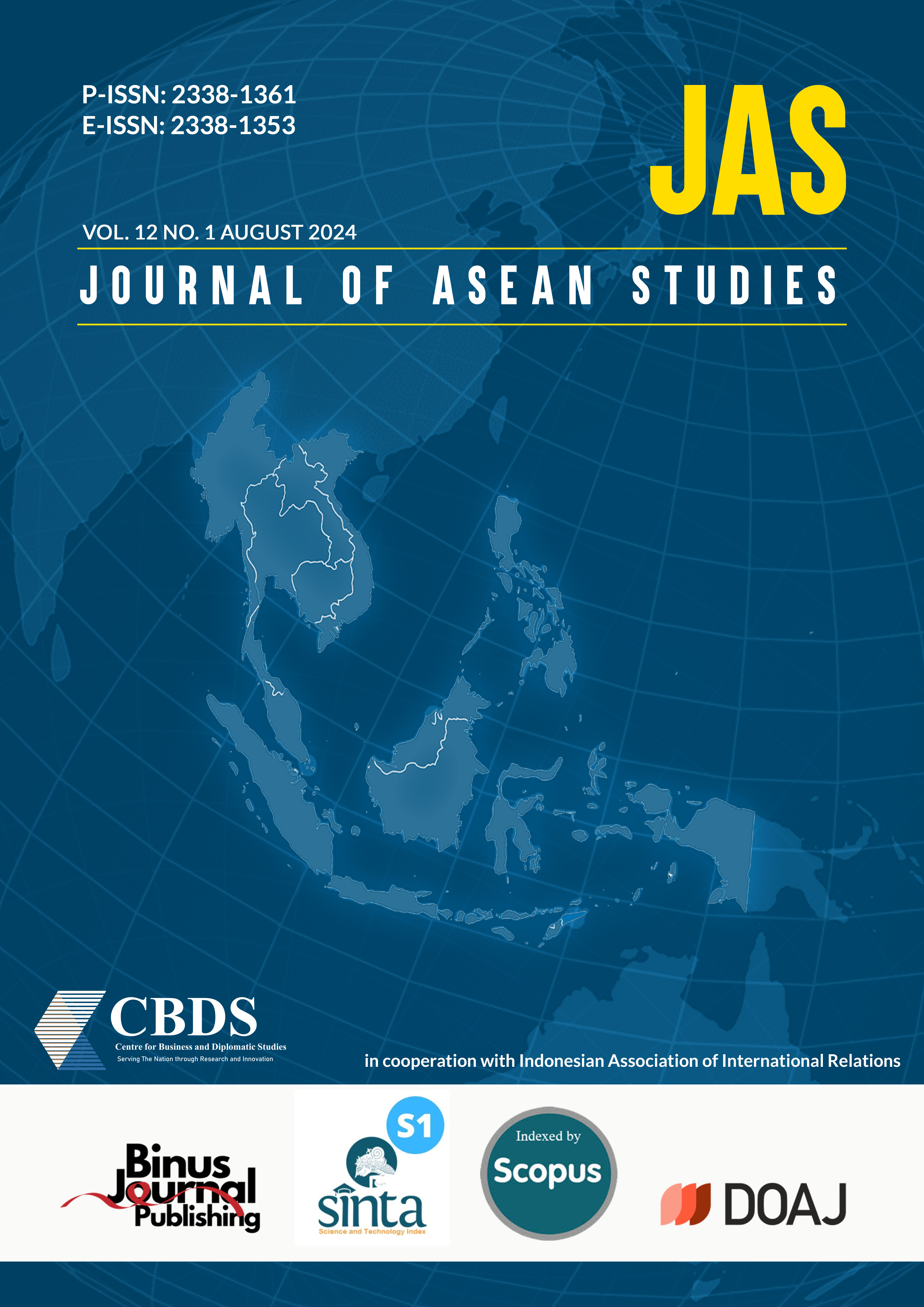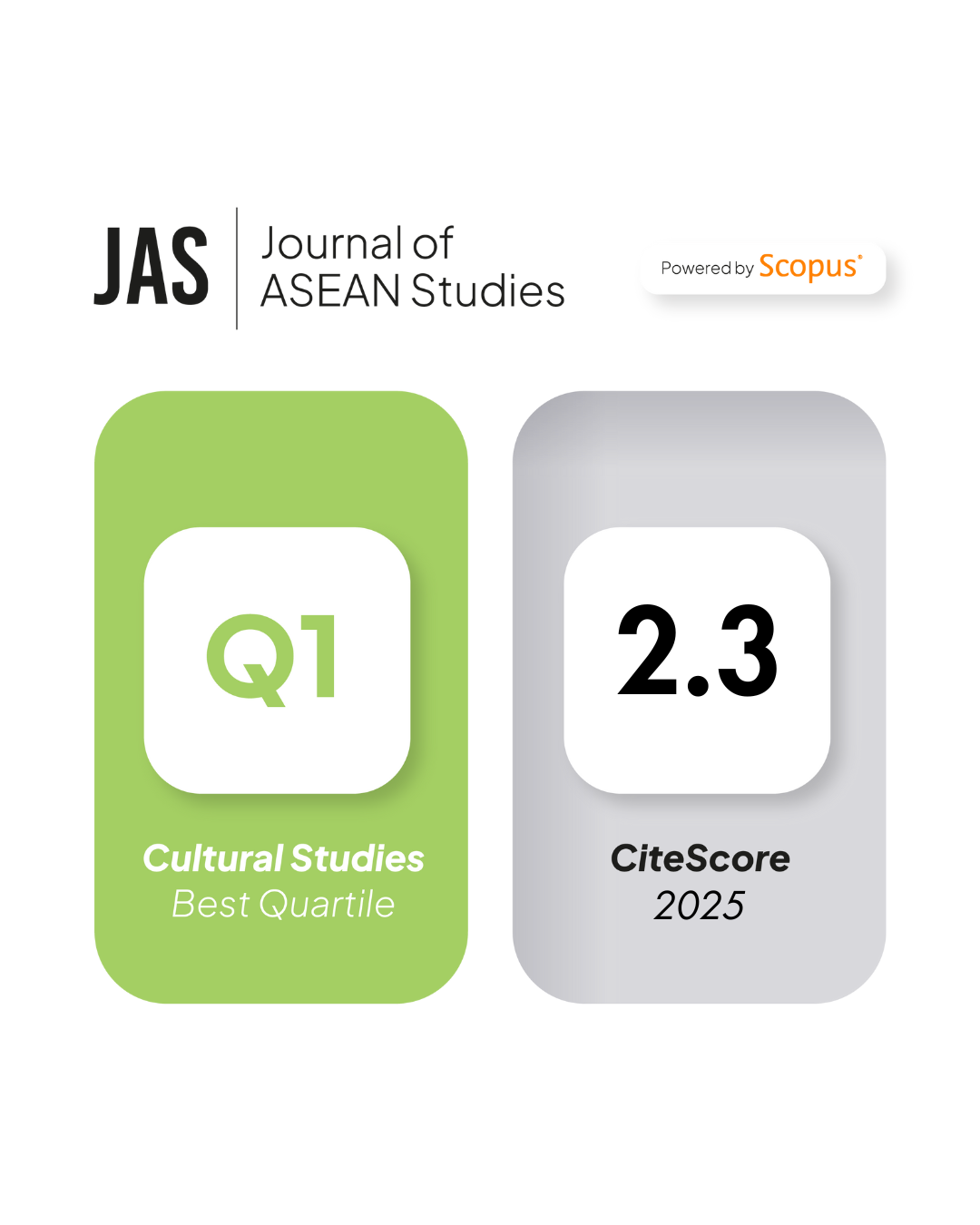Indonesia’s Spice-Based Gastrodiplomacy: Australia and Africa Continents as the Potential Markets
DOI:
https://doi.org/10.21512/jas.v12i1.8004Keywords:
Africa, Australia, Gastrodiplomacy, Indonesia Spice Up the World, Indonesian spicesAbstract
The history of the spice route has left a legacy in Indonesia and the rest of the world. To date, Indonesia continues to be a major global player in the spice trade. Pepper, nutmeg, cloves, mace, and cinnamon were the country’s primary exports. Food may foster cross-cultural understanding, which can enhance international cooperation and engagement. Thus, foods rich in spices can be an asset for Indonesia’s gastrodiplomacy. In collaboration with various non-state actors and coordinated by Indonesia‘s Coordinating Ministry of Maritime and Investment Affairs, the Indonesian government has developed an ambitious gastrodiplomacy strategy called â€Indonesia Spice Up the World†(ISUTW). Despite possible hurdles, Australia and Africa could be potential markets for further implementation of ISUTW. The research aims to answer the following questions: 1) To what extent has Indonesia promoted its spice-based gastrodiplomacy? and 2) What are the opportunities and challenges of Indonesia‘s spice-based gastrodiplomacy for the Australian and African markets? The research employs a mixed-method approach, including surveys to gather data about Indonesian cuisine businesses operating in Australia. This research incorporates a literature analysis, in-depth interviews, and focus group discussions with both state and non-state actors to strengthen the study, particularly in the context of the African market. Indonesia's gastrodiplomacy strategy, centered around spices, is suggested to prioritize Australia and Africa by leveraging cultural connections and existing market presence to effectively promote Indonesian gastronomy globally.
Â
References
Amal, M., & Galuh, N. M. K. (2022). Kerja sama Selatan-Selatan sebagai landasan signifikan hubungan bilateral ekonomi Indonesia-Namibia. In W. E. Pratignyo, S. Sjahril, A. M. Karnida, A. Hadiman, D. Ariastuti, A. Upiastirin, & C. Beslit (Eds.), Buku Peringatan 30 Tahun Hubungan Diplomatik Indonesia-Namibia (pp. 21-30). Bogor: PT Penerbit IPB Press.
Amalia, A. (2022). Gastro diplomasi kuliner Indonesia: Strategi dalam memperkuat ikatan kebudayaan dan politik Indonesia-Namibia. In W. E. Pratignyo, S. Sjahril, A. M. Karnida, A. Hadiman, D. Ariastuti, A. Upiastirin, & C. Beslit (Eds.), Buku peringatan 30 tahun hubungan Diplomatik Indonesia-Namibia (pp. 115-126). Bogor: PT. Penerbit IPB Press
Arnani, M. (2023, March 14). Pempek masuk 5 besar olahan seafood terbaik di dunia versi Taste Atlas. Kompas.com.
Astuti, Z. B., & Ramos, R. A. (2012). Ternate-Tidore Spice Islands: A territory branding process Conference paper. World Scientific and Engineering Academy and Society.
Australia’s Department of Foreign Affairs and Trade. (2020). Indonesia-Australia Comprehensive Economic Partnership Agreement. https://www.dfat.gov.au/trade/agreements/in-force/iacepa/indonesia-australia-comprehensive-economic-partnership-agreement
Australia’s Department of Foreign Affairs and Trade. (2018). Joint declaration on a comprehensive strategic partnership between Australia and the republic of Indonesia. https://www.dfat.gov.au/geo/indonesia/joint-declaration-comprehensive-strategic-partnership-between-the-commonwealth-of-australia-and-republic-of-indonesia
Australia’s Department of Home Affairs. (2022). Country Profile – Indonesia. https://www.homeaffairs.gov.au/research-and-statistics/statistics/country- profiles/profiles/indonesia
Australia’s Department of Home Affairs. (2016). Indonesia-born Community Information Summary. https://www.homeaffairs.gov.au/mca/files/2016-cis-indonesia.PDF
Bartels, D. (2010). The evolution of God in the Spice Islands: Converging and diverging of Protestant Christianity and Islam in the Moluccas during the colonial and post-colonial periods. In S. Susanne (Ed.), Christianity in Indonesia: Perspective of Power (pp. 225–258). Münster: Lit Verlag.
Catriana, E., & Djumena, E. (2020). Ini 3 subsektor ekonomi kreatif yang jadi penyumbang terbesar PDB Indonesia. Kompas.com. https://money.kompas.com/read/2020/08/30/151100526/ini-3-subsektor-ekonomi-kreatif-yang-jadi-penyumbang-terbesar-pdb-indonesia
Chernatony, L. (2008). Adapting brand theory to the context of nation branding. In D. Keith (Ed.), Nation Branding: Concepts, Issues, and Practices. Oxford: Elsavier Ltd.
Cheung, T. (2017, July 12). Your pick: World’s 50 best foods. CNN. https://edition.cnn.com/travel/article/world-best-foods-readers-choice/index.html
Chinweobo-Onuoha, Patience, N. O., & Onyemaechi, E. H. (2018). Influence of Indomie Noodles advertisement on the purchasing habits of consumers in two selected local government areas in Enugu state. Online Journal of Arts, Management and Social Sciences (OJAMSS), 3(1), 55–61.
Collins, J., Gibson, K., Alcorso, C., Castles, S., & Tait, D. A. (1995). A Shop Full of Dreams - Ethnic Small Business in Australia (pp 1–14). Pluto Press. http://www.multiculturalaustralia.edu.au/doc/ethbusiness_1.pdf.
Czarra, F. R. (2009). Spices: A global history. London: Reaktion Books.
Dalidjo, N. (2020) Rumah di Tanah Rempah: Penjelajahan Memaknai Rasa dan Aroma Indonesia. Jakarta: PT Gramedia Pustaka Utama.
Dinnie, K. (2008). Nation Branding: Concepts, Issues, Practice. Oxford: Elsevier Ltd.
Declaration of Indonesian Gastrodiplomacy. (2020). Unpublished document.
Hakam, S. (2022). Sejarah Namibia: Perjuangan menuju bangsa merdeka. In W. E. Pratignyo, S. Sjahril, A. M. Karnida, A. Hadiman, D. Ariastuti, A. Upiastirin, & C. Beslit (Eds.), Buku peringatan 30 tahun hubungan Diplomatik Indonesia-Namibia (pp. 3-18). Bogor: PT Penerbit IPB Press.
Hamada, I. (2011). The cross-cultural representation of the exotic: the Japanese restaurant in contemporary Australia. [Doctoral dissertation. The Asia Institute, Japanese Studies, the University of Melbourne].
Hammarberg, K., Kirkman, M., & de Lacey, S. (2016). Qualitative research methods: when to use them and how to judge them. Human Reproduction, 31(3), 498–501.
Indonesia Inspired akan diadakan di Inggris. (2008, October 7). Antara News. https://www.antaranews.com/berita/119637/indonesia-inspired-akan-diadakan-di-inggris
Indonesia Spice Up the World: Kenalkan rempah nusantara ke mancanegara. (2021). Kemenparekraf (Indonesia’s Ministry of Tourism and Creative Economy). https://www.kemenparekraf.go.id/hasil-pencarian/indonesia-spice-up-the-world-kenalkan-rempah-nusantara-ke-mancanegara
Indonesia’s Coordinating Ministry of Maritime and Investment Affairs. (2022a). Hasil rapat koordinasi program Indonesia Spice Up the World [Minutes of meeting for Indonesia Spice Up the World program]. Unpublished document.
Indonesia’s Coordinating Ministry of Maritime and Investment Affairs. (2022b). Indonesia Spice Up the World. Presentation presented at meeting for coordination for Indonesian Gastrodiplomacy program. Unpublished document.
Indonesia’s Coordinating Ministry of Maritime and Investment Affairs. (2022c). Indonesia Spice Up the World Narrative. Unpublished document.
Indonesia’s Coordinating Ministry of Maritime and Investment Affairs. (2021). Discussion on Indonesia Spice Up the World. Focus Group Discussion conducted on June 25, 2021
Indonesia’s Coordinating Ministry of Maritime and Investment Affairs. (2020a). Discussion on Indonesia Spice Up the World. Focus Group Discussion conducted on October 19, 2020.
Indonesia’s Coordinating Ministry of Maritime and Investment Affairs. (2020b). Discussion on Indonesia Spice Up the World. Focus Group Discussion conducted on October 5, 2020.
Indonesia’s Ministry of Foreign Affairs. (2021). Gastrodiplomasi Indonesia: Peran dan Dukungan Kemlu dalam Indonesia Spice Up the World. Focus Group Discussion conducted on July 27, 2021.
Indonesia’s Ministry of Foreign Affairs. (2020). Joint statement between the government of the republic of Indonesia and the government of Australia. https://kemlu.go.id/portal/id/read/1061/halaman_list_lainnya/joint-statement-between-the-government-of-the-republic-of-indonesia-and-the-government-of-australia
Ma, E., & Hsiao, A. (2020). The making of top fine-dining Chinese restaurants: Evidence from domestic and International customers in Australia. Journal of Food Service Business Research, 23(2), 113–132. https://doi.org/10.1080/15378020.2019.1686899
Menparekraf: Kuliner penyumbang ekonomi terbesar ekonomi kreatif. (2021). Kemenparekraf (Indonesia’s Ministry of Tourism and Creative Economy). https://pedulicovid19.kemenparekraf.go.id/menparekraf-kuliner-penyumbang-terbesar-pdb-ekonomi-kreatif/
Kye-Hong, M. (2016). Selection attributes and satisfaction of ethnic restaurant customers: A case of Korean restaurants in Australia. International Journal of Tourism Sciences, 16(4), 151–169. https://doi.org/10.1080/15980634.2016.1205298
Kye-Hong, M., & Seunghoon, H. (2017). Local consumers’ perceptions and preferences for Asian ethnic foods. International Journal of Tourism Sciences, 17(3), 165–179, https://doi.org/10.1080/15980634.2017.1349628
Mathews, K. (1987). Africa and non-alignment. India Quarterly: A Journal of International Affairs, 43(1), 40-51. https://doi.org/10.1177/097492848704300104
Maye-Banbury, A., & Casey, R. (2016). The sensuous secrets of shelter: How recollections of food stimulate Irish men’s reconstructions of their early formative residential experiences in Leicester, Sheffield, and Manchester. Irish Journal of Sociology, 24(3), 272–292. https://doi.org/10.1177/0791603516659503
Mulyasari, P. N. Gusnelly, Lissandhi, A.N., Reksa, F. A., Syahid, C.N., Yayusman, M.S., Aidulsyah, F. (2020). Strategi Branding Gastronomi di Era Digital dalam Memperkuat Gastrodiplomasi Indonesia [Gastronomy Branding Strategy in the Digital Era in Strengthening Indonesian Gastrodiplomacy]. Research Report. Jakarta: Research Center for Area Studies Indonesia Institute of Sciences and the Directorate of Strategic Research, Deputy for Strategic Policy, Ministry of Tourism and Creative Economy Republic of Indonesia/Tourism and Creative Economy Agency Republic of Indonesia.
Oktavia, M. H. (2021, April 11). CNN names Indonesia’s soto ayam among World’s 20 best soups. Kompas.com. https://go.kompas.com/read/2021/04/11/040751474/cnn-names-indonesias-soto-ayam-among-worlds-20-best-soups?page=all
Olomuyiwa, A. A. (2021) Future Image Investment Products from Indonesia. Presentation on Webinar “Thirty Years of Indonesia-Namibia Diplomatic Relations: Towards a Dynamic Economic Partnership on 10 May 2021, Windhoek, Namibia.
Peter, K. V. (Ed.). (2004). Handbook of Herbs and Spices Volume 2. Sawston: Woodhead Publishing Limited.
Pham, M. J. (2013). Food as communication: A case study of South Korea’s gastrodiplomacy. Journal of International Service, 22(1), 1–22.
Phillips, A. (2016). Beyond Bandung: The 1955 Asian-African Conference and its legacies for international order. Australian Journal of International Affairs, 70(4), 329-341. https://doi.org/10.1080/10357718.2016.1153600
Purnomo, A. P., Somantri, G. R. & Adnan, R. S. (2023). “Local Food” consumption: Does locality matter? Journal of ASEAN Studies, 11(1), 1-20, https:/doi.org/10.21512/jas.v11i1.7537
Quinlan, G. (2019, November 27). Australia and Indonesia: Speech to Jakarta foreign correspondents club. Australian Embassy Indonesia. https://indonesia.embassy.gov.au/jakt/AR19_003.html
Rahman, F. (2018). Negeri rempah-rempah: Dari masa bersemi hingga gugurnya kejayaan rempah-rempah. Patanjala, 11(3), 347–362. https://dx.doi.org/10.30959/patanjala.v11i3.527
Ramadhani, A., Yuliana, E. A., Sari, K., & Permata, Q. O. (2020). Diplomasi Indonesia melalui Indomie terhadap Nigeria. Global & Policy, 8(1), 51–64. https://doi.org/10.33005/jgp.v8i01.2171
Rendang kembali masuk daftar makanan terbaik dunia versi CNN. (2021, May 5). CNN. https://www.cnnindonesia.com/gaya-hidup/20210505125719-262-638829/rendang-kembali-masuk-daftar-makanan-terbaik-dunia-versi-cnn
Rockower, P. S. (2012). Recipes for gastrodiplomacy. Place Branding and Public Diplomacy, 8(3), 235–246. http://dx.doi.org/10.1057/pb.2012.17
Rockower, P. S. (2020). A guide to gastrodiplomacy. In Nancy, S. & N. J. Cull (Eds.). Routledge Handbook of Public Diplomacy. New York: Routledge.
Saptandari, P. & Yuniarti, M.D. (2022). Diplomasi budaya rempah menghangatkan hubungan kerja sama Indonesia ke negara-negara Afrika. In W. E. Pratignyo, S. Sjahril, A. M. Karnida, A. Hadiman, D. Ariastuti, A. Upiastirin, & C. Beslit. Indonesia-Namibia: Membangun Kemitraan, Sinergi, dan Solidaritas (pp. 103-114). Bogor: PT Penerbit IPB Press.
Sapuan, K. E., & Azizah, N. (2018). Strategi Pemerintah Indonesia Menggunakan Gastrodiplomacy Terhadap Australia (2004–2014). [Master’s thesis, Universitas Muhammadiyah Yogyakarta, Yogyakarta].
Sartin. (2021). Prospek Restoran Indonesia di Luar Negeri dalam Indonesia Spice Up the World. Presentation presented at the National Seminar of the Launching of Indonesia Spice Up the World, Research Center for Area Studies, National Research and Innovation Agency.
Spanyol promosikan kuliner Indonesia. (2012). Kompas.com. https://tekno.kompas.com/read/2012/12/17/15083697/spanyol-promosikan-kuliner-indonesia
Spence, C. (2016). Gastrodiplomacy: Assessing the role of food in decision-making. Flavour, 5(4), 1–16. https://doi.org/10.1186/s13411-016-0050-8
Spice it Up. (2015a). Spice it up: Who we are. http://spiceitup.id/who-we-are/#about-us
Spice it Up. (2015b). Spice it up Indonesia!. http://spiceitup.id
Tarrósy, I. (2016). Indonesia in Africa: Revitalizing Relations. Research paper. ASC Infosheet 29. https://scholarlypublications.universiteitleiden.nl/handle/1887/38988.
Teslik, L. H. (2007). Nation branding explained. Council on Foreign Relations. https://www.cfr.org/backgrounder/nation-branding-explained.
Trihartono, A., Purwowibowo, Santoso, B., Pamungkas, F. Z., & Nisya, C. (2020). The early stage of Indonesia’s gastrodiplomacy: In the middle of nowhere? IOP Conference Series: Earth and Environmental Science 485, 1-8. https://doi.org/10.1088/1755-1315/485/1/012008
Uzo, U., & Nzegwu, L. (2018). Indomie noodles in Africa: Lessons on digital and cultural branding. Emerald Emerging Markets Case Studies, 8(1), 1-8. http://dx.doi.org/10.1108/EEMCS-03-2017-0048
vom Brocke, J., Simons, A., Niehaves, B., Riemer, K., Plattfaut, R., & Cleven, A. (2009). Reconstructing the giant: on the importance of rigour in documenting the literature search process. 17th European Conference on Information Systems (ECIS 2009), Verona, Italy.
Wildan, M. (2016). Program “Spice It Up”. https://kebudayaan.kemdikbud.go.id/ditwdb/program-spice-it-up/
Wilson, R. (2011). Cocina Peruana Para El Mundo: Gastrodiplomacy, the culinary nation brand, and the context of national cuisine in Peru. Exchange: The Journal of Public Diplomacy, 2(2), 13–20.
Yayusman, M. S., Yaumidin, U. K., & Mulyasari, P. N. (2023). On considering Australia: Exploring Indonesian restaurants in promoting ethnic foods as an instrument of Indonesian gastrodiplomacy. Journal of Ethnic Foods, 10(43). https://doi.org/10.1186/s42779-023-00207-1
Zhang, J. (2015). The foods of the worlds: Mapping and comparing contemporary gastrodiplomacy campaigns. International Journal of Communication, 9, 568–591.
Downloads
Published
How to Cite
Issue
Section
License
Copyright (c) 2024 Meilinda Sari Yayusman, Prima Nurahmi Mulyasari

This work is licensed under a Creative Commons Attribution-NonCommercial 4.0 International License.


























